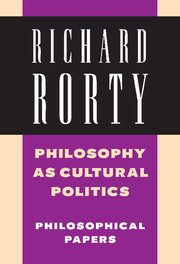Book contents
- Frontmatter
- Contents
- Preface
- Acknowledgments
- I RELIGION AND MORALITY FROM A PRAGMATIST POINT OF VIEW
- 1 Cultural politics and the question of the existence of God
- 2 Pragmatism as romantic polytheism
- 3 Justice as a larger loyalty
- 4 Honest mistakes
- II PHILOSOPHY'S PLACE IN CULTURE
- III CURRENT ISSUS WITHIN ANALYTIC PHILOSOPHY
- Index of names
2 - Pragmatism as romantic polytheism
Published online by Cambridge University Press: 05 June 2012
- Frontmatter
- Contents
- Preface
- Acknowledgments
- I RELIGION AND MORALITY FROM A PRAGMATIST POINT OF VIEW
- 1 Cultural politics and the question of the existence of God
- 2 Pragmatism as romantic polytheism
- 3 Justice as a larger loyalty
- 4 Honest mistakes
- II PHILOSOPHY'S PLACE IN CULTURE
- III CURRENT ISSUS WITHIN ANALYTIC PHILOSOPHY
- Index of names
Summary
In 1911 a book appeared in Paris with the title Un romantisme utilitaire: étude sur le mouvement pragmatiste. This was the first of three volumes on the subject by René Berthelot. Berthelot had been struck by the resemblances between the views of William James, John Dewey, Nietzsche, Bergson, Poincaré, and certain Catholic Modernists. He was the first to treat them as belonging to the same intellectual movement. A convinced Cartesian, Berthelot disliked and distrusted all these thinkers, but he wrote about them with acuity and verve. He traced the romantic roots of pragmatism back behind Emerson to Schelling and Hoelderlin, and the utilitarian roots to the influence of Darwin and Spencer. But he thought that the difference between these two modes of thought was too great to permit synthesis. “In all its different forms,” Berthelot said, “pragmatism reveals itself to be a romantic utilitarianism: that is its most obviously original feature and also its most private vice and its hidden weakness.”
Berthelot was probably the first to call Nietzsche “a German pragmatist,” and the first to emphasize the resemblance between Nietzsche's perspectivism and the pragmatist theory of truth. This resemblance – frequently noted since, notably in a seminal chapter of Arthur Danto's book on Nietzsche – is most evident in The Gay Science. There Nietzsche says “We do not even have any organ at all for knowing, for ‘truth’; we ‘know’ … just as much as may be useful in the interest of the human herd.”
- Type
- Chapter
- Information
- Philosophy as Cultural PoliticsPhilosophical Papers, pp. 27 - 41Publisher: Cambridge University PressPrint publication year: 2007
- 3
- Cited by



